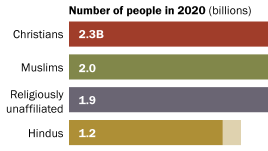
Many Religious ‘Nones’ Around the World Hold Spiritual Beliefs
Despite their nonreligious identity, many unaffiliated adults hold spiritual or religious beliefs. About a fifth or more in 22 countries believe in an afterlife, for example.
Numbers, Facts and Trends Shaping Your World
Despite their nonreligious identity, many unaffiliated adults hold spiritual or religious beliefs. About a fifth or more in 22 countries believe in an afterlife, for example.
All
Publications
Eight-in-ten Americans say they learned little or nothing about the Mormon religion during the 2012 presidential campaign, according to a new Pew Research Center poll. At the same time, poll findings suggest some warming of attitudes toward Mormonism, especially among religious groups that voted heavily for Mitt Romney.
Leading up to the election, there was speculation about how strongly white evangelical Protestants would support a Mormon candidate. According to a new Pew Research Center analysis of exit poll data, white evangelicals voted for Mitt Romney with as much enthusiasm as his other supporters did.
On Nov. 20, a Pakistani court ordered blasphemy charges dropped against a Christian teenager who had been accused of burning pages from the Quran. A new Pew Forum analysis finds that as of 2011 nearly half the countries and territories in the world have laws against blasphemy, apostasy or defamation.
The newly elected 113th Congress includes the first Buddhist to serve in the Senate, the first Hindu to serve in either chamber and the first member of Congress to describe her religion as “none.” While Congress remains majority Protestant, the institution is far less so today than it was 50 years ago.
The U.S. Conference of Catholic Bishops will meet in Baltimore for their annual Fall General Assembly on Nov. 12-15. Seven-in-ten Catholics say they are very (24%) or somewhat satisfied (46%) with the leadership of the American bishops, according to a Pew Research Center Survey.
Christians remain the largest religious group, and Muslims grew the fastest from 2010 to 2020. Read how the global share of Buddhists, Hindus, Jews and the religiously unaffiliated changed.
Most who use astrology (or a horoscope), tarot cards or a fortune teller say they do so just for fun rather than for insights about life.
After years of decline, the U.S. Christian share now shows signs of leveling off. The new Religious Landscape Study explores trends in identity, beliefs and practices.
The Global Religious Futures (GRF) project is jointly funded by The Pew Charitable Trusts and The John Templeton Foundation. Here are some big-picture findings from the GRF, together with context from other Pew Research Center studies.








